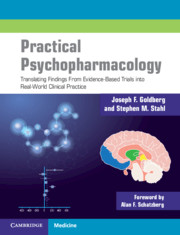 Practical Psychopharmacology
Practical Psychopharmacology Book contents
- Practical Psychopharmacology
- Practical Psychopharmacology
- Copyright page
- Dedication
- Contents
- Foreword
- Preface
- Abbreviations
- Part I General Principles
- 1 Core Concepts of Good Psychopharmacology
- 2 Targets of Treatment: Categories versus Dimensions of Psychopathology
- 3 Interpreting and Using the Literature: Integrating Evidence-Based Trials with Real-World Practice
- 4 Placebo and Nocebo Effects
- 5 Tailoring the Fit: Moderators and Mediators of Treatment Outcome
- 6 Complex Regimens and Rationale-Based Combination Drug Therapies
- 7 Laboratory Values and Psychiatric Symptoms: What to Measure, What Not to Measure, and What to Do With The Results
- 8 Pharmacogenetics: When Relevant, When Not
- 9 Cross-tapering and the Logistics of Drug Discontinuation
- 10 Managing Major Adverse Drug Effects: When to Avoid, Switch, or Treat Through
- 11 Novel Drug Therapeutics: Nutraceuticals, Steroids, Probiotics, and Other Dietary Supplements
- 12 Human Diversity and Considerations in Special Populations
- Part II Targets of Pharmacotherapy
- References
- Index
4 - Placebo and Nocebo Effects
from Part I - General Principles
Published online by Cambridge University Press: 19 October 2021
- Practical Psychopharmacology
- Practical Psychopharmacology
- Copyright page
- Dedication
- Contents
- Foreword
- Preface
- Abbreviations
- Part I General Principles
- 1 Core Concepts of Good Psychopharmacology
- 2 Targets of Treatment: Categories versus Dimensions of Psychopathology
- 3 Interpreting and Using the Literature: Integrating Evidence-Based Trials with Real-World Practice
- 4 Placebo and Nocebo Effects
- 5 Tailoring the Fit: Moderators and Mediators of Treatment Outcome
- 6 Complex Regimens and Rationale-Based Combination Drug Therapies
- 7 Laboratory Values and Psychiatric Symptoms: What to Measure, What Not to Measure, and What to Do With The Results
- 8 Pharmacogenetics: When Relevant, When Not
- 9 Cross-tapering and the Logistics of Drug Discontinuation
- 10 Managing Major Adverse Drug Effects: When to Avoid, Switch, or Treat Through
- 11 Novel Drug Therapeutics: Nutraceuticals, Steroids, Probiotics, and Other Dietary Supplements
- 12 Human Diversity and Considerations in Special Populations
- Part II Targets of Pharmacotherapy
- References
- Index
Summary
If the placebo effect is not the bane of every psychopharmacologist’s existence, it probably should be. Placebo responses largely negate all rules of pharmacodynamics, undermine theories about drug mechanisms of action, ruin clinical trials by causing failed (rather than negative) findings that mask the true potential for otherwise promising compounds, inflate costs for drug research and development, and generally give a black eye to neuroscience-based explanations for psychopathology. They also lend humility to clinicians’ assumptions that psychopharmacology reliably holds the upper hand when dealing with any and all matters of mental illness. In this chapter we will review known clinical features and correlates (if not actual predictors) of placebo responsivity across major psychiatric conditions, and offer guidance about how clinicians can anticipate, recognize and manage placebo effects – rather than ignore, dismiss, or otherwise struggle against them.
- Type
- Chapter
- Information
- Practical PsychopharmacologyTranslating Findings From Evidence-Based Trials into Real-World Clinical Practice, pp. 73 - 88Publisher: Cambridge University PressPrint publication year: 2021
